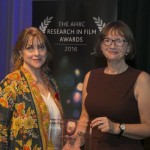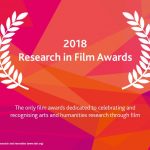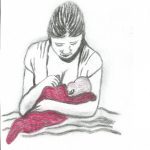
Maria Abdel Karim, Postgraduate Research student in the Faculty of Media & Communication has been shortlisted for the final round of the prestigious Student Widescreen Film of the Year Competition.
Maria’s film ‘Two Women Can Tango’ has been picked from hundreds of entries from around the world to be screened alongside five other short films on Thursday 10 October 2019 at the Widescreen Weekend festival.
The narrative short film, shot in London, was presented as Maria’s Masters film for BU. Maria believes her film carries a strong humanitarian message behind it and a clear message that love is able to connect humans despite all their differences. It tells the story of Reem, a Palestinian young woman living in London on a sponsored visa who only has a couple of months before her visa expires when she meets Alma, a British-Jewish Tango instructor who sweeps her off her feet the moment they have their first Tango dance together. As the Tango between the two women escalate, Reem’s days in London become countable. She is left with only one choice to make.
The Student Widescreen Film of the Year Competition is one of the premier international events for showcasing young, emerging talent working with widescreen filmmaking technology. This unique competition strives to celebrate widescreen film and technologies within all genres. Previous entrants have spanned a range of methods including documentary, animation and short clips.
 BU academic wins AHRC Research in Film Innovation Award
BU academic wins AHRC Research in Film Innovation Award Submissions for the AHRC Research in Film Awards 2018 are now open
Submissions for the AHRC Research in Film Awards 2018 are now open FHSS student awarded Chiropractor of the Year 2018-19
FHSS student awarded Chiropractor of the Year 2018-19










 REF Code of Practice consultation is open!
REF Code of Practice consultation is open! BU Leads AI-Driven Work Package in EU Horizon SUSHEAS Project
BU Leads AI-Driven Work Package in EU Horizon SUSHEAS Project Evidence Synthesis Centre open at Kathmandu University
Evidence Synthesis Centre open at Kathmandu University Expand Your Impact: Collaboration and Networking Workshops for Researchers
Expand Your Impact: Collaboration and Networking Workshops for Researchers ECR Funding Open Call: Research Culture & Community Grant – Apply now
ECR Funding Open Call: Research Culture & Community Grant – Apply now ECR Funding Open Call: Research Culture & Community Grant – Application Deadline Friday 12 December
ECR Funding Open Call: Research Culture & Community Grant – Application Deadline Friday 12 December MSCA Postdoctoral Fellowships 2025 Call
MSCA Postdoctoral Fellowships 2025 Call ERC Advanced Grant 2025 Webinar
ERC Advanced Grant 2025 Webinar Update on UKRO services
Update on UKRO services European research project exploring use of ‘virtual twins’ to better manage metabolic associated fatty liver disease
European research project exploring use of ‘virtual twins’ to better manage metabolic associated fatty liver disease